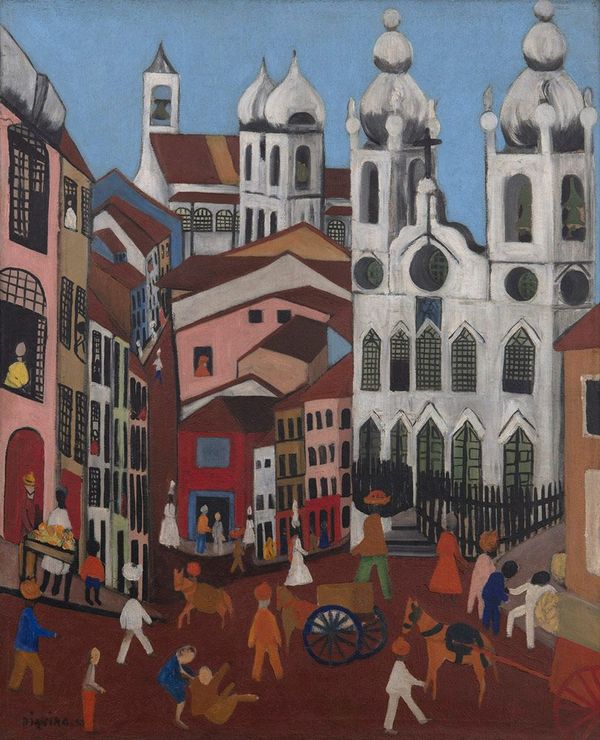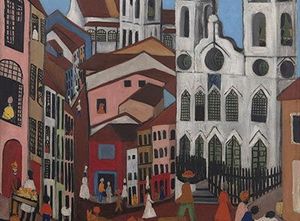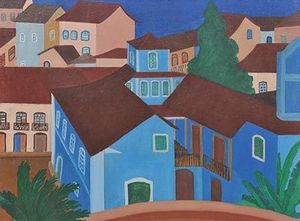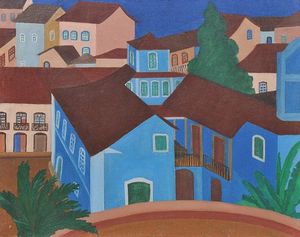The experience of work was one of the central axes of Djanira Motta e Silva's production, an option that was outlined in the mid-1950s and persisted until the end of her career in the 1970s. Her practice as an artist is organized around the theme of social engagement in art, and informed by experiences of Brazilian popular culture. With remarkable complexity, Djanira's art covered themes such as festive and religious manifestations and urban amusement - which open up to the oneiric - reaching her ambitious project of portraying rural workers and laborers in the 1960s and 1970s. As well as paintings, she also produced drawings, engravings and murals.
Djanira was an engaged artist, which can be seen not only in her political statements but also in her aesthetic choices, which highlight collective life. From the 1950s onwards, she began to depict faceless characters in compositions with an almost geometric rigor. This singular choice brings the notion of collectivity to the foreground of her painting - taking distance from private and isolated identities - which becomes the artist's style over the years. Djanira was a self-taught artist, and her aesthetic interest is mainly informed by her working-class background. Of indigenous descent on her paternal side and Austrian descent on her maternal side, Djanira worked as a seamstress and rural worker on coffee plantations before beginning her artistic career. She is recognized as a member of the second generation of Brazilian modernism, a group of artists who shared an interest in the daily lives of the working classes. Among the painters with whom she maintained a close dialogue in her early career were José Pancetti and Milton Dacosta.
Silva incorporates a broad modernist repertoire, which includes references such as post-impressionism, Mexican muralism and, in the 1950s, an inclination toward constructive tendencies, without, however, ever abandoning figurative art. In 1952, she was awarded the Prêmio de Viagem pelo País at the 1st National Modern Art Salon, an event that had relevant impact on her artistic research. During this period, the artist set up a studio in Salvador and visited the cities of the Recôncavo Baiano.
In her contact with different places and cultures, on her frequent trips around Brazil, she always sought direct experience and close observation of the different contexts she portrayed. Djanira's traveller character had relevant influence on her production, and can be understood as a working method. Many of her works originated from investigations into cultures and practices she experienced when travelling, for instance: her investigation into the Baroque from Minas Gerais; the religions of African origin in Bahia; the experience of living with the Canela Indigenous people in Maranhão, and the set of canvases produced during her long stay in New York, among others.
Throughout her career, she held solo exhibitions in New York, Washington and Boston and group exhibitions in cities such as London, Buenos Aires, Montevideo, Edinburgh and Paris. In 1977, the Museu Nacional de Belas Artes presented an important retrospective of her career. Recently, the exhibition Djanira: A memória de seu povo at MASP in 2019, examined Djanira's modern legacy. Her works are part of the public collections of the Museu Nacional de Belas Artes, Rio de Janeiro; Museu de Arte Moderna do Rio de Janeiro – MAM Rio; Fundação Edson Queiroz, Fortaleza; Museu de Arte de São Paulo Assis Chateaubriand - MASP; Museu de Arte de Brasília; Instituto Casa Roberto Marinho, Rio de Janeiro; Itaú Cultural, São Paulo; Museu Oscar Niemeyer, Curitiba; Itamaraty, Brasilia; Museus Castro Maya, Rio de Janeiro, among others.





